人教版八年级上册英语 Unit7 Will people have robots SectionA 1a-2d课件(共46张PPT,部分含音频)
文档属性
| 名称 | 人教版八年级上册英语 Unit7 Will people have robots SectionA 1a-2d课件(共46张PPT,部分含音频) |
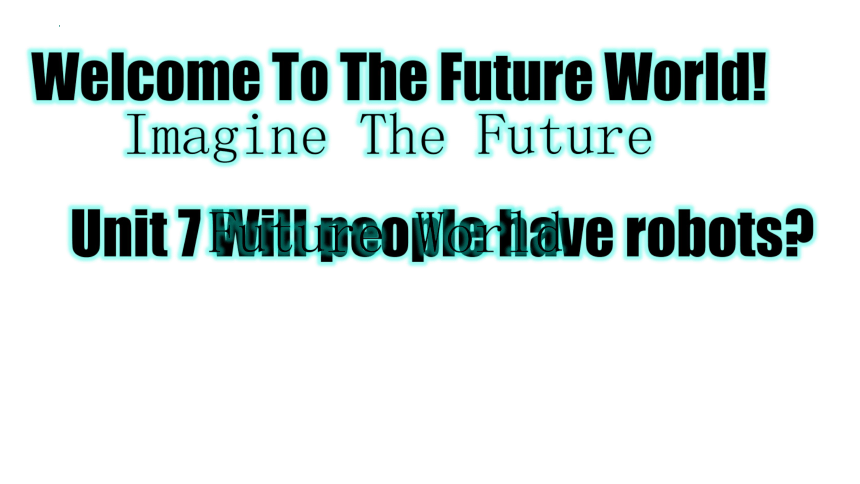
|
|
| 格式 | pptx | ||
| 文件大小 | 29.3MB | ||
| 资源类型 | 教案 | ||
| 版本资源 | 人教新目标(Go for it)版 | ||
| 科目 | 英语 | ||
| 更新时间 | 2023-11-23 00:00:00 | ||
图片预览

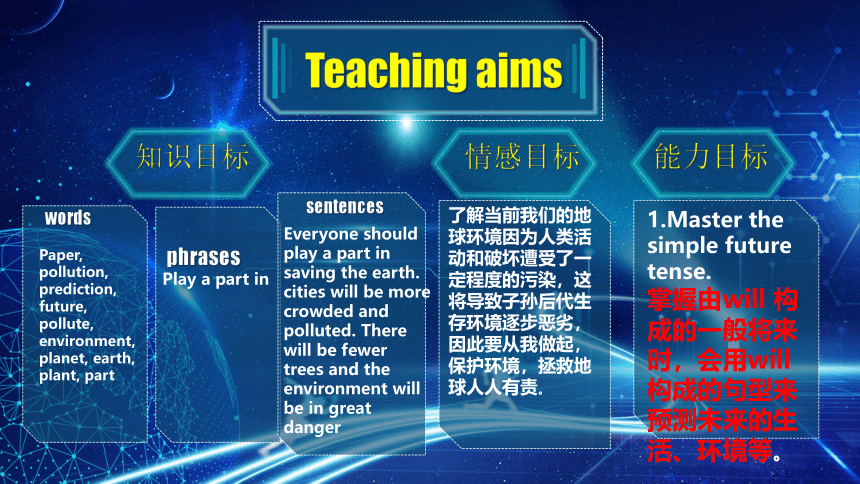
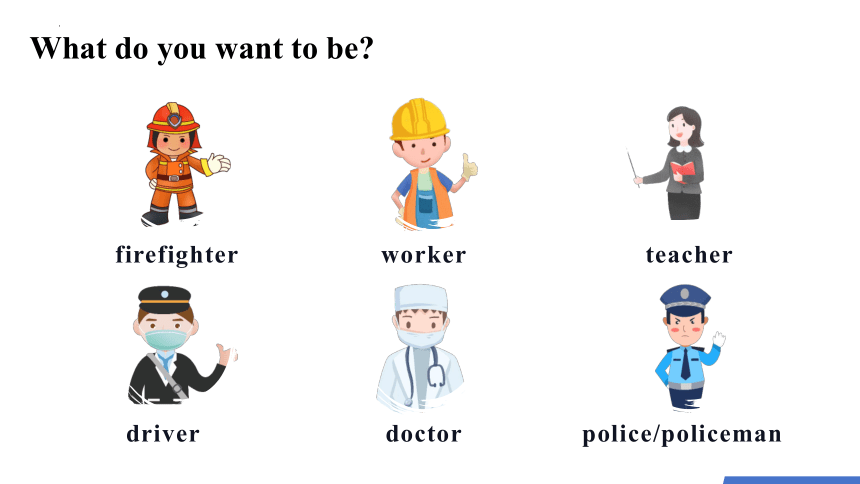
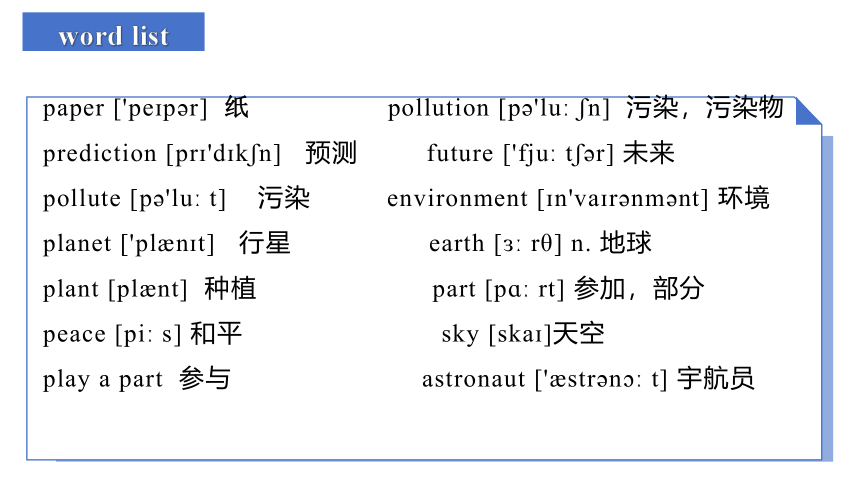
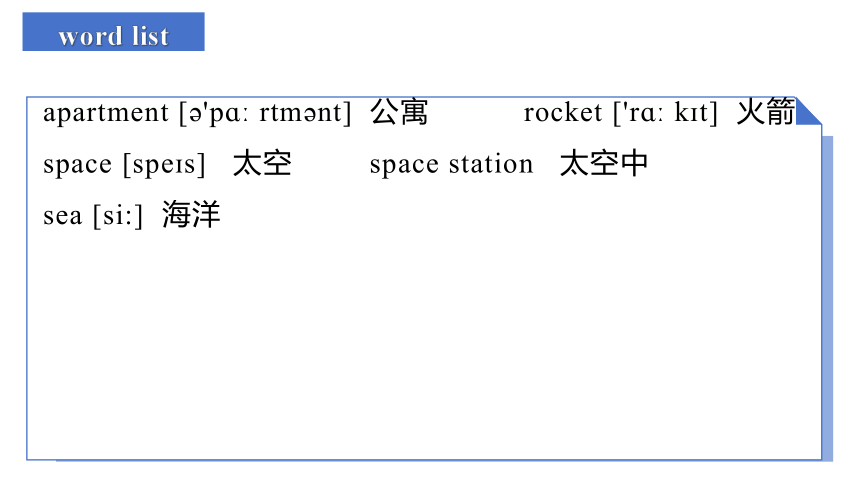
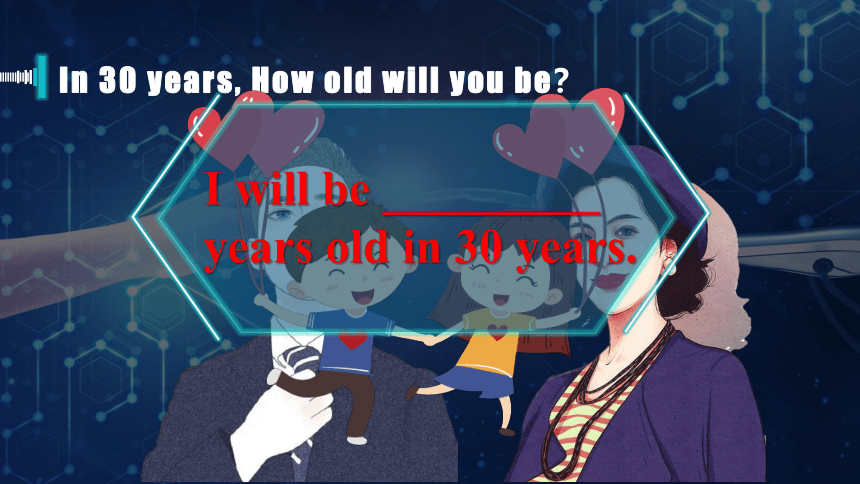
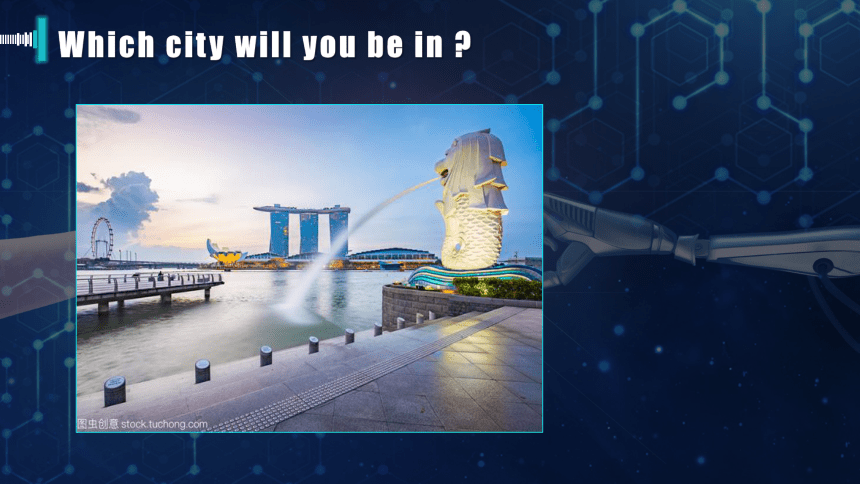
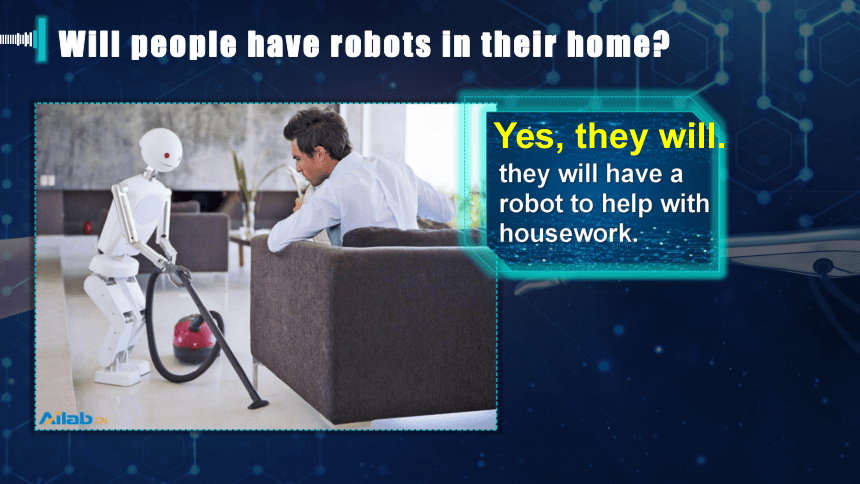
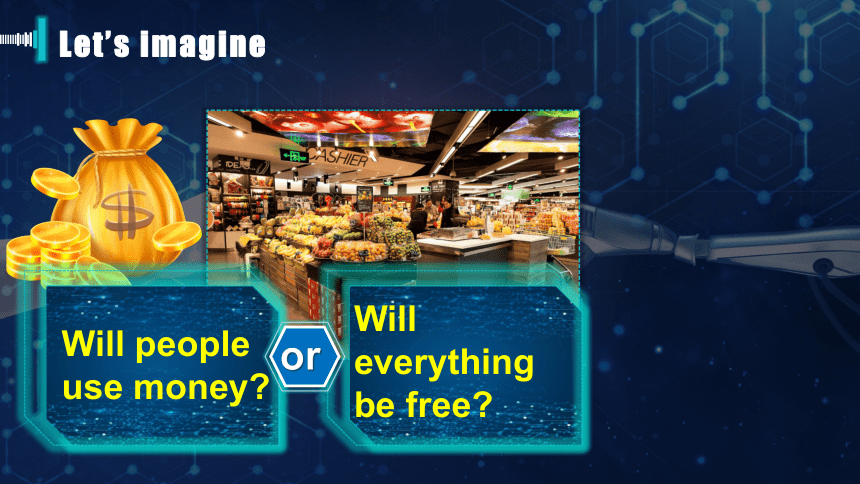
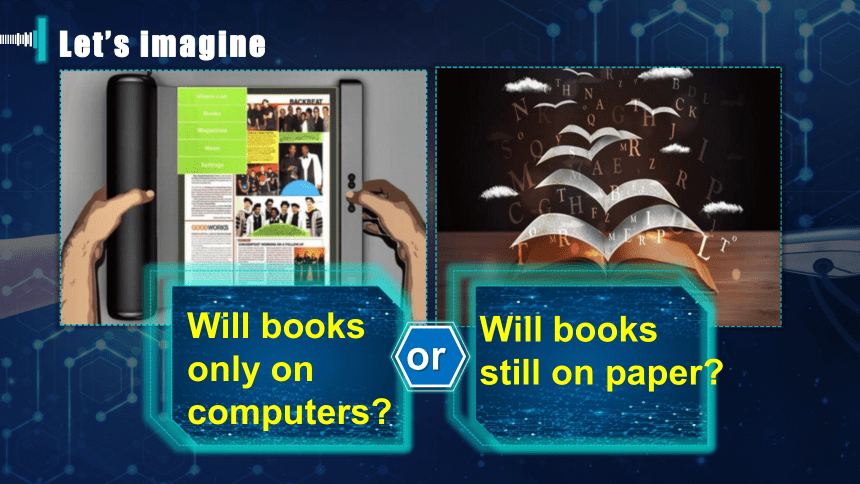
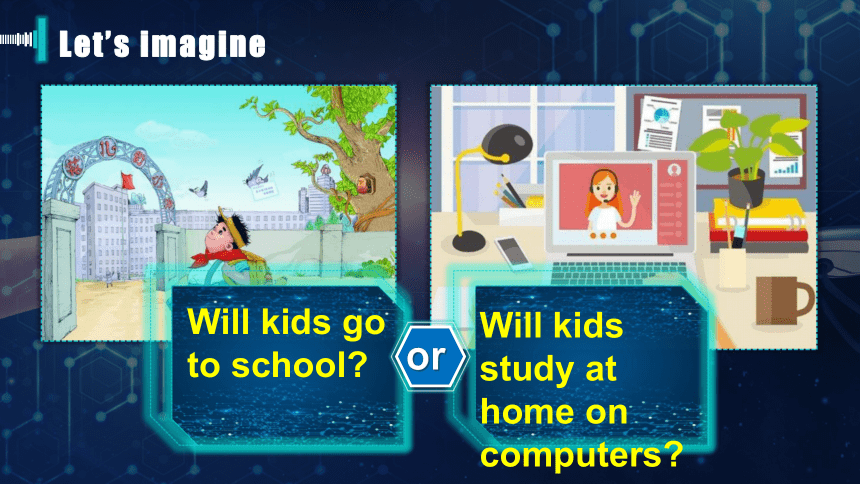
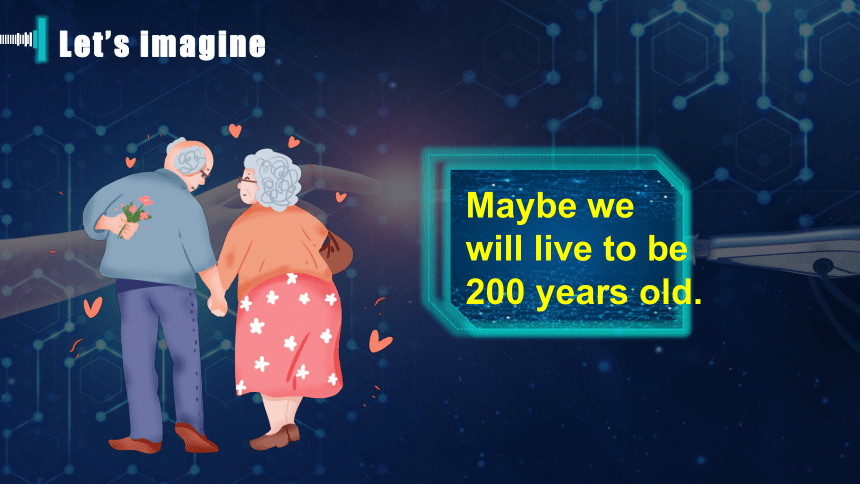
文档简介
(共46张PPT)
Unit 7 Will people have robots
Future World
Welcome To The Future World!
Imagine The Future
Teaching aims
知识目标
情感目标
能力目标
phrases
words
Paper, pollution, prediction, future, pollute, environment, planet, earth, plant, part
Play a part in
sentences
Everyone should play a part in saving the earth.
cities will be more crowded and polluted. There will be fewer trees and the environment will be in great danger
1.Master the simple future tense.
掌握由will 构成的一般将来时,会用will 构成的句型来预测未来的生活、环境等。
了解当前我们的地球环境因为人类活动和破坏遭受了一定程度的污染,这将导致子孙后代生存环境逐步恶劣,因此要从我做起,保护环境,拯救地球人人有责。
What do you want to be
firefighter
worker
teacher
driver
doctor
police/policeman
paper ['pe p r] 纸 pollution [p 'lu n] 污染,污染物
prediction [pr 'd k n] 预测 future ['fju t r] 未来
pollute [p 'lu t] 污染 environment [ n'va r nm nt] 环境
planet ['pl n t] 行星 earth [ rθ] n. 地球
plant [pl nt] 种植 part [pɑ rt] 参加,部分
peace [pi s] 和平 sky [ska ]天空
play a part 参与 astronaut [' str n t] 宇航员
word list
apartment [ 'pɑ rtm nt] 公寓 rocket ['rɑ k t] 火箭
space [spe s] 太空 space station 太空中
sea [si:] 海洋
word list
In 30 years, How old will you be?
I will be _________ years old in 30 years.
Which city will you be in
Will people have robots in their home
Yes, they will.
they will have a robot to help with housework.
Let’s imagine
Will people use money
Will everything
be free
or
Let’s imagine
Will books only on computers
Will books still on paper
or
Let’s imagine
Will kids study at home on computers
Will kids go to school
or
Let’s imagine
Maybe we will live to be 200 years old.
What can you imagine what our life will be in 30 years
We will …
We won’t …
There will be…
will not=won’t
1a
How will the world be different in the future, 100 years from now Read these predictions. Check (√) A (for agree) or D (for disagree).
People will have robots in their homes.
1
Books will only be on computers, not on paper.
2
People won’t use money. Everything will be free.
3
Kids won’t go to school. They’ll study at home on computers.
4
There will be only one country.
5
People will live to be 200 years old.
6
1a
Listen and circle questions you hear in 1a.
People will have robots in their homes.
1
Books will only be on computers, not on paper.
2
People won’t use money. Everything will be free.
3
Kids won’t go to school. They’ll study at home on computers.
4
There will be only one country.
5
People will live to be 200 years old.
6
predictions
Work in pairs
——Will people use money in 100 years
——No, they won’t . Everything will be free.
—— Will people live to be 100 years old
—— Yes, they will.
观察下列句子划线部分,它们有什么共同之处?
People will have robots in their homes.
Books will only be on computers, not on paper.
People won’t use money. Everything will be free.
There will be only one country.
Will people use money in 100 years
——No, they won’t .
—— Will people live to be 100 years old
—— Yes, they will.
他们都是含有Will 的肯定陈述句以及一般疑问句
它们表示什么时态?
一般将来时的构成
will/shall + 实义动词原形/系表结构
be going to + 实义动词原形/系表结构
一般将来时的标志
tomorrow类:tomorrow, the day after tomorrow 等
next +时间:next week, next month, next year 等
in + 时间段:in two days, in a week 等
其他:in the future , one day, someday 等
形式 用法 人称 变化
shall 征求意见 更多用于 第一人称 shall无变化
will 表示意愿 临时决定 不限 will无变化
be going to 已计划好 有迹象的 不限 be有变化
只用will/shall 表示将来的情况
表示有礼貌的询问对方是否愿意
表示个人愿意做的事
表示临时决定要做的事
一般将来时肯定句型
主语 + will/shall + 动词原形
主语 + am/is/are going to + 动词原形
一般将来时否定句型
主语 + will/shall + not + 动词原形
主语 + am/is/are + not + going to + 动词原形
一般将来时一般疑问句型
Will/Shall + 主语 + 动词原形…
Am/Is/Are + 主语 + going to + 动词原形…
一般将来时特殊疑问句型
疑问词 + will/shall/be going to + 主语 + 动词原形…
用括号内的时间状语改写句子
I visit my grandparents. (next weekend)
I will visit my grand-parents next weekend.
3
will/shall + 动词原形
表示将来发生,推测或临时决定要做的事
be going to + 动词原形
表示主观上计划,打算做某事或
will 和 shall 作为助动词
shall 多用于第一人称
will 多用于第二/三人称
shall I/we 用于征求对方意见
2a
Listen and circle the words you hear.
There will be (more / less / fewer) people.
There will be (more / less / fewer) free time.
There will be (more / less / fewer) cars.
There will be (more / less / fewer) pollution.
There will be (more / less / fewer) trees.
What’s difference between fewer and less
Fewer or less
__________ students
__________ cars
__________ trees
__________ flowers
__________ free time
__________ pollution
__________ milk
__________ water
Fewer
Fewer
Fewer
Fewer
less
less
less
less
fewer是few的比较级,修饰可数名词,意为“更少”。
less是little的比较级,修饰不可数名词,意为“更少”。
How will the world be different 100 years from now
Will people have robots in their home
Will people use money in 100 years
Will kids only be on computer, not on paper
Will people take a plane to anywhere
Will people live to be 200 years old
Yes, they will.
Yes, they will./No, they won't
Yes, they will.
No, they won't.
Yes, they will.
How will the world be different 100 years from now
As for students, what will the school life be like
Books will only be on computer, not on paper.
Students won't (will not) do homework with pens. They just use the computers.
Kids won't (will not) go to school. They'll study at home on computers.
There will be less schools and classrooms.
...
There will be less...
有更少的......
How will the world be different 100 years from now
As for people, what will the city be like
There will be more people.
There will be fewer cars.
There will be less pollution(污染).
People will live to be 200 years old.
People will use the subway to work.
Cities will be very big and crowded.
There will be 有.....
2b
Listen again. Check ( ) the predictions you hear.
There will be (more / less / fewer) people. ________
There will be (more / less / fewer) free time. ________
There will be (more / less / fewer) cars. ________
There will be (more / less / fewer) pollution. ________
There will be (more / less / fewer) trees. ________
more
less
fewer
更多
更少
water
energy
noise
homework
shops jobs
workers
children
teachers
water
energy
fat
noise
homework
education
funny
music
workers
jobs
children
shops
teachers
修饰不可数名词
修饰可数名词
Countable nouns Uncountable nouns
There will be more people. There will be more pollution.
There will be fewer trees. There will be less free time.
There won't be more water. There won't be more trees.
There won't be fewer cars. There won't be less fat.
2b
Listen again. Check ( ) the predictions you hear.
There will be (more / less / fewer) people. ________
There will be (more / less / fewer) free time. ________
There will be (more / less / fewer) cars. ________
There will be (more / less / fewer) pollution. ________
There will be (more / less / fewer) trees. ________
2c
Make conversations about the predictions in 2a and 2b.
I think there will be more pollution.
Really I don’t think so. But I think there will be fewer trees.
What’s your prediction about the future?
Why
Compare the 2 pictures
More buildings
fewer buildings
Fewer cars
more cars
Fewer trees
More trees
Which city do you want to live in
Everyone has his/her predictions
about future life. Now let's read
the conversation and listen to
Mike's and Jill's ideas.
1. What does Jill think of the future
2. Jill and Nick want to live on the earth, what can they do
3. How should everyone save the earth Talk about your
views.
Read the conversation and answer the questions.
Nick: What are you reading, Jill
Jill: It’s a book about the future.
Nick: Sounds cool. So what will the future be like
Jill: Well, cities will be more crowded and polluted. There will be fewer trees and the environment will be in great danger.
Nick: That sounds bad! Will we have to move
to other planets
Jill: Maybe. But I want to live on the earth.
Nick: Me, too. Then what can we do
Jill: We can use less water and plant more trees. Everyone should play a part in saving the earth.
Role-play the conversation.
Language points
There will be fewer trees and the environment will be in great danger.
(1)There will be是there be句型的将来时形式,也可用there is/are going to be…来表将来时。
例如:There will/is going to be a football match in our school tomorrow.
明天我们学校将有一场足球比赛。
注意:
there与be动词连用表示“有”,不能与have连用出现在同一句话中。
即:
没有“There will have”以及“There is/are going to have”这样的表达方式
(2) Be in (great) danger. 处于(极大的)危险当中
Nick: What are you reading, Jill
Jill: It’s a book about the future.
Nick: Sounds cool. So what will the future be like
Jill: Well, cities will be more crowded and polluted. There will be fewer trees and the environment will be in great danger.
Nick: That sounds bad! Will we have to move
to other planets
Jill: Maybe. But I want to live on the earth.
Nick: Me, too. Then what can we do
Jill: We can use less water and plant more trees. Everyone should play a part in saving the earth.
Role-play the conversation.
在地球上
=take part in
=play a role in
Language points
Everyone should play a part in saving the
earth. 每个人都应当尽一份力来拯救地球。
play a part in doing sth是一个固定结构,表示
“参与……; 在…… 中尽自己一份力量” 例如:
She plays an active part in teaching these poor children.
她积极参加对这些贫穷孩子的教学工作。
He didn’t play a part in making this decision.
他并没有参与做出此决定。
1. What does Jill think of the future
2. Jill and Nick want to live on the earth, what can they do
3. How should everyone save the earth Talk about your
views.
Read the conversation and answer the questions.
She thinks cities will be more crowded and polluted. There will be fewer trees and the environment will be in great danger.
They can use less water and plant more trees.
Everyone should play a part in saving the earth.
We should take more subways or buses instead of
private cars.We should recycle the paper.
...
Fill in the blanks According to the conversation.
Jill is reading a book about__________. Can
you predict what the future ____ ____ like
Cities ___ ___ more crowded and polluted. There ___ ___ fewer trees and the environment ___ ___ in great danger.
_____ we _____ _____ move to other planets
What can we do to live on the earth
We can use ___ water and plant _____ trees.Everyone should _____ _____ ____ ___ saving the earth.
will
be
will
be
will
be
will
be
Will
have
to
play
a
part
in
less
more
the future
+
What else can we do to save the earth
Don’t eat wild animals
Pick up rubbish in the streets
Protect the rivers
and so on…(等等,这里加工下)
It’s our duty to save our earth.
We can’t change the past, but we can face the future
It’s time for nature.
It’s time for earth.
Act now!
Unit 7 Will people have robots
Future World
Welcome To The Future World!
Imagine The Future
Teaching aims
知识目标
情感目标
能力目标
phrases
words
Paper, pollution, prediction, future, pollute, environment, planet, earth, plant, part
Play a part in
sentences
Everyone should play a part in saving the earth.
cities will be more crowded and polluted. There will be fewer trees and the environment will be in great danger
1.Master the simple future tense.
掌握由will 构成的一般将来时,会用will 构成的句型来预测未来的生活、环境等。
了解当前我们的地球环境因为人类活动和破坏遭受了一定程度的污染,这将导致子孙后代生存环境逐步恶劣,因此要从我做起,保护环境,拯救地球人人有责。
What do you want to be
firefighter
worker
teacher
driver
doctor
police/policeman
paper ['pe p r] 纸 pollution [p 'lu n] 污染,污染物
prediction [pr 'd k n] 预测 future ['fju t r] 未来
pollute [p 'lu t] 污染 environment [ n'va r nm nt] 环境
planet ['pl n t] 行星 earth [ rθ] n. 地球
plant [pl nt] 种植 part [pɑ rt] 参加,部分
peace [pi s] 和平 sky [ska ]天空
play a part 参与 astronaut [' str n t] 宇航员
word list
apartment [ 'pɑ rtm nt] 公寓 rocket ['rɑ k t] 火箭
space [spe s] 太空 space station 太空中
sea [si:] 海洋
word list
In 30 years, How old will you be?
I will be _________ years old in 30 years.
Which city will you be in
Will people have robots in their home
Yes, they will.
they will have a robot to help with housework.
Let’s imagine
Will people use money
Will everything
be free
or
Let’s imagine
Will books only on computers
Will books still on paper
or
Let’s imagine
Will kids study at home on computers
Will kids go to school
or
Let’s imagine
Maybe we will live to be 200 years old.
What can you imagine what our life will be in 30 years
We will …
We won’t …
There will be…
will not=won’t
1a
How will the world be different in the future, 100 years from now Read these predictions. Check (√) A (for agree) or D (for disagree).
People will have robots in their homes.
1
Books will only be on computers, not on paper.
2
People won’t use money. Everything will be free.
3
Kids won’t go to school. They’ll study at home on computers.
4
There will be only one country.
5
People will live to be 200 years old.
6
1a
Listen and circle questions you hear in 1a.
People will have robots in their homes.
1
Books will only be on computers, not on paper.
2
People won’t use money. Everything will be free.
3
Kids won’t go to school. They’ll study at home on computers.
4
There will be only one country.
5
People will live to be 200 years old.
6
predictions
Work in pairs
——Will people use money in 100 years
——No, they won’t . Everything will be free.
—— Will people live to be 100 years old
—— Yes, they will.
观察下列句子划线部分,它们有什么共同之处?
People will have robots in their homes.
Books will only be on computers, not on paper.
People won’t use money. Everything will be free.
There will be only one country.
Will people use money in 100 years
——No, they won’t .
—— Will people live to be 100 years old
—— Yes, they will.
他们都是含有Will 的肯定陈述句以及一般疑问句
它们表示什么时态?
一般将来时的构成
will/shall + 实义动词原形/系表结构
be going to + 实义动词原形/系表结构
一般将来时的标志
tomorrow类:tomorrow, the day after tomorrow 等
next +时间:next week, next month, next year 等
in + 时间段:in two days, in a week 等
其他:in the future , one day, someday 等
形式 用法 人称 变化
shall 征求意见 更多用于 第一人称 shall无变化
will 表示意愿 临时决定 不限 will无变化
be going to 已计划好 有迹象的 不限 be有变化
只用will/shall 表示将来的情况
表示有礼貌的询问对方是否愿意
表示个人愿意做的事
表示临时决定要做的事
一般将来时肯定句型
主语 + will/shall + 动词原形
主语 + am/is/are going to + 动词原形
一般将来时否定句型
主语 + will/shall + not + 动词原形
主语 + am/is/are + not + going to + 动词原形
一般将来时一般疑问句型
Will/Shall + 主语 + 动词原形…
Am/Is/Are + 主语 + going to + 动词原形…
一般将来时特殊疑问句型
疑问词 + will/shall/be going to + 主语 + 动词原形…
用括号内的时间状语改写句子
I visit my grandparents. (next weekend)
I will visit my grand-parents next weekend.
3
will/shall + 动词原形
表示将来发生,推测或临时决定要做的事
be going to + 动词原形
表示主观上计划,打算做某事或
will 和 shall 作为助动词
shall 多用于第一人称
will 多用于第二/三人称
shall I/we 用于征求对方意见
2a
Listen and circle the words you hear.
There will be (more / less / fewer) people.
There will be (more / less / fewer) free time.
There will be (more / less / fewer) cars.
There will be (more / less / fewer) pollution.
There will be (more / less / fewer) trees.
What’s difference between fewer and less
Fewer or less
__________ students
__________ cars
__________ trees
__________ flowers
__________ free time
__________ pollution
__________ milk
__________ water
Fewer
Fewer
Fewer
Fewer
less
less
less
less
fewer是few的比较级,修饰可数名词,意为“更少”。
less是little的比较级,修饰不可数名词,意为“更少”。
How will the world be different 100 years from now
Will people have robots in their home
Will people use money in 100 years
Will kids only be on computer, not on paper
Will people take a plane to anywhere
Will people live to be 200 years old
Yes, they will.
Yes, they will./No, they won't
Yes, they will.
No, they won't.
Yes, they will.
How will the world be different 100 years from now
As for students, what will the school life be like
Books will only be on computer, not on paper.
Students won't (will not) do homework with pens. They just use the computers.
Kids won't (will not) go to school. They'll study at home on computers.
There will be less schools and classrooms.
...
There will be less...
有更少的......
How will the world be different 100 years from now
As for people, what will the city be like
There will be more people.
There will be fewer cars.
There will be less pollution(污染).
People will live to be 200 years old.
People will use the subway to work.
Cities will be very big and crowded.
There will be 有.....
2b
Listen again. Check ( ) the predictions you hear.
There will be (more / less / fewer) people. ________
There will be (more / less / fewer) free time. ________
There will be (more / less / fewer) cars. ________
There will be (more / less / fewer) pollution. ________
There will be (more / less / fewer) trees. ________
more
less
fewer
更多
更少
water
energy
noise
homework
shops jobs
workers
children
teachers
water
energy
fat
noise
homework
education
funny
music
workers
jobs
children
shops
teachers
修饰不可数名词
修饰可数名词
Countable nouns Uncountable nouns
There will be more people. There will be more pollution.
There will be fewer trees. There will be less free time.
There won't be more water. There won't be more trees.
There won't be fewer cars. There won't be less fat.
2b
Listen again. Check ( ) the predictions you hear.
There will be (more / less / fewer) people. ________
There will be (more / less / fewer) free time. ________
There will be (more / less / fewer) cars. ________
There will be (more / less / fewer) pollution. ________
There will be (more / less / fewer) trees. ________
2c
Make conversations about the predictions in 2a and 2b.
I think there will be more pollution.
Really I don’t think so. But I think there will be fewer trees.
What’s your prediction about the future?
Why
Compare the 2 pictures
More buildings
fewer buildings
Fewer cars
more cars
Fewer trees
More trees
Which city do you want to live in
Everyone has his/her predictions
about future life. Now let's read
the conversation and listen to
Mike's and Jill's ideas.
1. What does Jill think of the future
2. Jill and Nick want to live on the earth, what can they do
3. How should everyone save the earth Talk about your
views.
Read the conversation and answer the questions.
Nick: What are you reading, Jill
Jill: It’s a book about the future.
Nick: Sounds cool. So what will the future be like
Jill: Well, cities will be more crowded and polluted. There will be fewer trees and the environment will be in great danger.
Nick: That sounds bad! Will we have to move
to other planets
Jill: Maybe. But I want to live on the earth.
Nick: Me, too. Then what can we do
Jill: We can use less water and plant more trees. Everyone should play a part in saving the earth.
Role-play the conversation.
Language points
There will be fewer trees and the environment will be in great danger.
(1)There will be是there be句型的将来时形式,也可用there is/are going to be…来表将来时。
例如:There will/is going to be a football match in our school tomorrow.
明天我们学校将有一场足球比赛。
注意:
there与be动词连用表示“有”,不能与have连用出现在同一句话中。
即:
没有“There will have”以及“There is/are going to have”这样的表达方式
(2) Be in (great) danger. 处于(极大的)危险当中
Nick: What are you reading, Jill
Jill: It’s a book about the future.
Nick: Sounds cool. So what will the future be like
Jill: Well, cities will be more crowded and polluted. There will be fewer trees and the environment will be in great danger.
Nick: That sounds bad! Will we have to move
to other planets
Jill: Maybe. But I want to live on the earth.
Nick: Me, too. Then what can we do
Jill: We can use less water and plant more trees. Everyone should play a part in saving the earth.
Role-play the conversation.
在地球上
=take part in
=play a role in
Language points
Everyone should play a part in saving the
earth. 每个人都应当尽一份力来拯救地球。
play a part in doing sth是一个固定结构,表示
“参与……; 在…… 中尽自己一份力量” 例如:
She plays an active part in teaching these poor children.
她积极参加对这些贫穷孩子的教学工作。
He didn’t play a part in making this decision.
他并没有参与做出此决定。
1. What does Jill think of the future
2. Jill and Nick want to live on the earth, what can they do
3. How should everyone save the earth Talk about your
views.
Read the conversation and answer the questions.
She thinks cities will be more crowded and polluted. There will be fewer trees and the environment will be in great danger.
They can use less water and plant more trees.
Everyone should play a part in saving the earth.
We should take more subways or buses instead of
private cars.We should recycle the paper.
...
Fill in the blanks According to the conversation.
Jill is reading a book about__________. Can
you predict what the future ____ ____ like
Cities ___ ___ more crowded and polluted. There ___ ___ fewer trees and the environment ___ ___ in great danger.
_____ we _____ _____ move to other planets
What can we do to live on the earth
We can use ___ water and plant _____ trees.Everyone should _____ _____ ____ ___ saving the earth.
will
be
will
be
will
be
will
be
Will
have
to
play
a
part
in
less
more
the future
+
What else can we do to save the earth
Don’t eat wild animals
Pick up rubbish in the streets
Protect the rivers
and so on…(等等,这里加工下)
It’s our duty to save our earth.
We can’t change the past, but we can face the future
It’s time for nature.
It’s time for earth.
Act now!
同课章节目录
- Unit 1 Where did you go on vacation?
- Section A
- Section B
- Unit 2 How often do you exercise?
- Section A
- Section B
- Unit 3 I'm more outgoing than my sister.
- Section A
- Section B
- Unit 4 What's the best movie theater?
- Section A
- Section B
- Unit 5 Do you want to watch a game show?
- Section A
- Section B
- Unit 6 I'm going to study computer science.
- Section A
- Section B
- Unit 7 Will people have robots?
- Section A
- Section B
- Unit 8 How do you make a banana milk shake?
- Section A
- Section B
- Unit 9 Can you come to my party?
- Section A
- Section B
- Unit 10 If you go to the party, you'll have a grea
- Section A
- Section B
